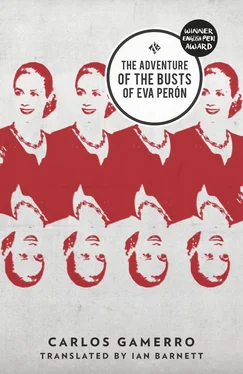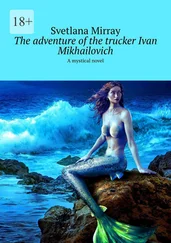Dragged down by his cider hangover — a first far worse than he had ever imagined — and racked by an exhaustion that had escalated from the physical to the metaphysical, Marroné cast about in all directions to see if he could find something to cling on to in the midst of the wreck. Then he saw the statue of Eva, standing tall and proud and unscathed in the general corruption scattered at her feet, and she was the most beautiful woman he’d ever seen. Rapt by her loveliness, he knelt down in the fountain and kissed her small, frozen feet, resting his cheek against her fine ankles, not knowing whether it was the water flowing from her hands or his own tears running down his cheeks. Prostrate before her, he confessed his boundless contrition and remorse.
‘Radiant Eva, immaculate Eva, Eva most beauteous, I beseech thee… I don’t love my wife, I can’t stand my children, I try to influence people, I left my best friend for dead, I’ve been… fingered… I don’t know what to do. I’m lost, I can’t go on, I can’t go back… If you know, my lady, I beg you, show me the way…’
And, when he raised his eyes to her face, Eva seemed to answer him. Not in words, but with an eternally even, eternally quiet smile — a smile of stone. The tilt of her neck and face, the half-open eyelids, the slight curve of her nose, all seemed to be pointing to one spot, which was hidden by Marroné’s hands and face. He drew them back hurriedly: on one side of the pedestal, carved in Roman characters, there was a name, which must have been the sculptor’s: Rogelio García.
Marroné clasped her cold and lovely body and, standing on tiptoe, stretched up to her lips to leave his offering of a kiss.
‘Thank you, Evita… Thank you…’
On his way out he ran into Aníbal, who, yawning profusely, was locking up.
‘Would you like them to bring your car?’
‘No, I’ll walk, thanks.’ Marroné groped for a plausible lie. ‘I came… by train.’
‘You amaze me. What a passion for the authentic.’
Outside, a pale dawn had taken the heavens by storm. He didn’t need to ask for directions: he had only to join the blurred V of hazy figures converging on a single point with the defeated, trudging gait of those who rise in darkness every working day. Near the train station was a bar, whose tables and windows were thick with dust, turned to velvet by the early morning sun, and right next to the door, a public telephone, so orange it glowed. He ordered a milky coffee and croissants, and asked for the telephone directory; he found the man he was looking for with his third call.
A train so covered in graffiti that it looked like a mural on wheels pulled up in eerie silence at the deserted platform. Marroné curled up like a dog at the far end of the last carriage and noticed that, like himself, the inside was broken in a variety of ways: the green imitation leather of the seats was cracked or slashed; the rings of the handrails had been wrenched from their leather straps; the windows were jammed shut or had panes missing, and bore the scorch marks of flames that, after bursting them, had licked their innards. The train got under way with a series of choking rattles; it was like travelling in a snake with a broken spine. Two stations further on and his carriage had filled with early birds on their way to work, the odd old man, hawkers peddling their wares — and with a certain curiosity he noticed that no one had wanted to occupy the three free seats around him. He must have looked and smelt worse than he had supposed. But he didn’t feel like company anyway and, turning back to his jammed window, he devoted himself to contemplating the landscape through the dusty glass filigreed by old rain: unplastered, flat-roofed brick or cement houses, building sites suspended in eternal construction as if a magic spell had been cast over them, mechanics’ workshops overflowing with cars, front gardens, builders’ yards, sheds, fields, churches, shops, cars at level-crossings, main roads bristling with intrusive perpendicular billboards. The rhythmical impetus of the train drew a forgotten childhood prayer from his lips: ‘Good Fairy who laughs with the angels, I promise to be good as you wish, respecting the Lord, loving my country, loving General Perón, studying and being for everyone the child you dreamt: healthy, happy, polite and pure of heart.’ At the moments of greatest acceleration between stations, the contours and boundaries of the visible world began to merge and give: a cart morphed into a gate, a low wall into some waste ground, the sky blue of a house into the blue sky. When the train slowed down again, with a clatter like a captive Titan rattling his chains at regular intervals, things would return to their original, separate selves; but there came a point when the crazed engine driver just kept accelerating and they zoomed through first one station, then another, then another, each platform shorter than the last; the eye became incapable of taking in anything more than a single long broad brushstroke sweeping across trees, houses, gardens and signs, and soaking up their colours to paint a face so huge Marroné feared that, when complete, it would be too vast for his eyes to take in.
He opened them to a disc of sky bordered with heads, and in its outline he could make out the profile of her face. Disappointed to find that what they’d taken for a fatality had been no more than a fainting fit, the ring of people around him immediately opened and the beloved features melted away like a cloud into the sky. But that instant had been enough to make Marroné smile in recognition: it was Eva, of course; she was still with him, she was everywhere, she would never abandon him. Before the crowd had dispersed, two men hauled him up by the armpits, supporting him until they were certain he wouldn’t fall again and break his neck on the platform, and sending him on his way with an ‘Alright, pal, get yourself back home now and sleep it off’, and other such trifles. After doing his incoherent drunk impression and muttering his unintelligible thanks with a faraway smile (he’d decided to role-play the character; if he had lost the ability to win friends and influence people — and everything suggested he had — he could still at least play along with them), he looked up at a sign to discover that by some miracle they’d got him off the train at the right station — the one the man had mentioned on the phone — and decided to take it as a good omen, being in great need of one: if the evil enchanters had not given up their pursuit, they may at least have taken the day off.
The tracks in these parts ran along a deep, narrow gully, along which he could see no more than a patch of blue sky, the ubiquitous English station, another train whose great solar eye approached as silently as the one that had brought him, and the riotous summer foliage of the chinaberry trees, whose merciful shade shielded him from the unforgiving sun. With some difficulty he climbed the uneven steps of a cement staircase and, nearing the top, looked around him. Beyond the mandatory park of eucalyptuses that lined the tracks, stretched an ordered landscape of little bungalows shaped like pats of butter, with Spanish roofs, columns and wooden shutters with diamond fretwork, gardens with flower beds, the odd parked car and occasional garden gnome. He ventured along leafy streets that looked straight but curved imperceptibly as he walked, passing several children riding bikes in the middle of the road, an old woman wheeling a shopping bag and a soda-siphon delivery truck, before plucking up the courage to ask a passing resident out walking his dog.
‘Oh, yes. That’s in the First District, over towards the bun. Let’s see… Keep still, boy!’ he told the cocker tugging at its lead. ‘You go straight on…’
Читать дальше











